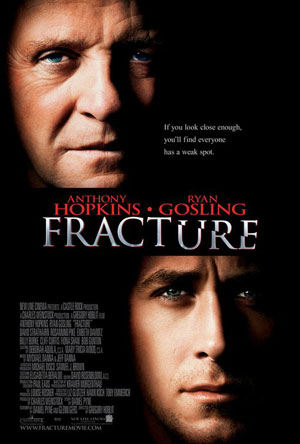 There’s something so 1998 about a courtroom movie that hosts a supposed battle of wits between a crafty psychopath and an out-of-his-league-yet-still-somehow-capable young hotshot attorney. And the people bringing you Fracture have no problem with that. They’re banking on people wanting to relive the days when theaters were filled to the brim with simple, undemanding John Grisham and James Patterson adaptations that people took on faith as “thrillers,” even though they were the very antithesis of such in their rote predictability. Fracture is less of a film and more like a compendium of that period, with every ridiculous archetype imaginable thrown in and topped with a delusional aspiration to Hitchcockian heights. If it’d simply been re-titled Nineties Thriller Movie and had a few scenes of slapstick added in, the box office prospects for this film would have likely increased exponentially. As it is, however, you’re going to have to be astute enough a filmgoer to see the unintentional parody all on your own in order to enjoy this for what it is, for as a thriller or mystery of any sort, it fails miserably.
There’s something so 1998 about a courtroom movie that hosts a supposed battle of wits between a crafty psychopath and an out-of-his-league-yet-still-somehow-capable young hotshot attorney. And the people bringing you Fracture have no problem with that. They’re banking on people wanting to relive the days when theaters were filled to the brim with simple, undemanding John Grisham and James Patterson adaptations that people took on faith as “thrillers,” even though they were the very antithesis of such in their rote predictability. Fracture is less of a film and more like a compendium of that period, with every ridiculous archetype imaginable thrown in and topped with a delusional aspiration to Hitchcockian heights. If it’d simply been re-titled Nineties Thriller Movie and had a few scenes of slapstick added in, the box office prospects for this film would have likely increased exponentially. As it is, however, you’re going to have to be astute enough a filmgoer to see the unintentional parody all on your own in order to enjoy this for what it is, for as a thriller or mystery of any sort, it fails miserably.
The story is promising enough to start with. Ted Crawford (Anthony Hopkins) is a structural engineer who finds faults for a living. He’s married to a beautiful, bored wife (Embeth Davidtz) who’s running around on the side with a younger hunk (Billy Burke). As our film begins, he heads home early fully aware of his wife’s indiscretions and stops off at the hunk’s apartment along the way, where the couple are frolicking publicly at the pool. Crawford sneaks into the apartment, does something (it has to do with the "big twist" at the end), and then leaves for home to await wifey. When she arrives, he babbles on for a bit, tells her he loves her, and shoots her in the face. It’s not a simple crime of passion, however, as crafty Ted has planned this down to the smallest detail and turns himself in to the cops for a game of cat-and-mouse, wherein he’s always six steps ahead of everyone else. At the same time, a young district attorney (Ryan Gosling) who wants success and court victory at all costs prepares to leave for a cushy, lucrative private law gig when he’s assigned to Crawford’s initial hearing as the proverbial “one last job.”
Now, at this point, there’s still potential for a decent movie, even with the clichés piling up. The problem with Fracture is that director Gregory Hoblit seems to misunderstand the simple appeal of letting two charismatic actors go at it, and decides to raid other thrillers for plot elements that simply don’t belong here in an effort to add texture and depth. Gosling’s Willy Beachum is a Southern good ole’ boy living in
Just to make matters worse, Hoblit stuffs the film with two subplots that should’ve been deleted before this script was first saved in Final Draft. The first is that young hunk
All of this is really just meant to set up two moments: The first is when Gosling will have to make a critical moral decision that is meant to show us that the cocky Southern boy cares about more than himself and his vanity and has become a better person than the slickster we were introduced to at the beginning, and the second is the much ballyhooed “plot twist” where Hopkins will ostensibly dazzle the audience with how he got away with it, and like all magic tricks, the solution is hidden, both figuratively and literally, in plain sight. If I were Devin, I’d go ahead and divulge this, but really, it’s beside the point. The only value this film carries is in the appeal of its two leads facing off, and if that’s not enough, then you’ll be sorely disappointed in everything else.